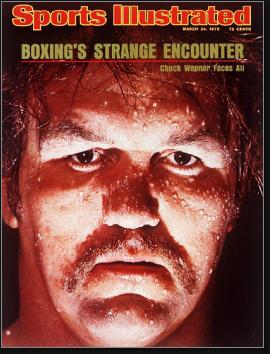
Sport: Boxing
Born: February 26, 1939
Town: Bayonne, New Jersey
Charles Wepner Jr. was born February 26, 1939 in New York City. He grew up in Bayonne, NJ, the son of former prizefighter Charlie Wepner. “Chuck” learned his craft from his dad and fought in the Bayonne Police Athletic League as a teenager. He joined the Marines after high school and was unbeaten during his time in the service. After his discharge, Chuck worked as a bouncer and fought several amateur bouts—in the ring and in various bars and parking lots. Chuck’s official amateur record was 16–0 (he liked to claim 81–0 “when you included the other stuff”). In 1964, he became the first New Jersey heavyweight to win the New York Golden Gloves.
Chuck made his pro debut at the age of 25, knocking out George Cooper in front of friends and family at City Stadium in Bayonne. His first bout against a ranked opponent came in 1966, against Buster Mathis. Mathis knocked Chuck down in the first round and won the fight on a technical knockout, five rounds later. Chuck recovered to win 14 of his next 15 fights, including a victory over Don McAteer for the New Jersey State Heavyweight crown.
In 1968, Chuck met young George Foreman in Madison Square Garden. Despite his 18–4–2 record at this point, Chuck had earned a reputation for cutting easily—but also for soldiering on. Foreman ripped open a cut over Chuck’s eye in the first round, and kept working it until it was too gruesome to continue. The fight was called in the third round.
Chuck had an opportunity to reclaim contender status in 1970 with fights against aging Sonny Liston and English star Joe Bugner. He lost both fights, with Liston tearing his face apart until the ring doctor stopped the fight in the ninth round. It took 120 stitches to close his wounds. The Bugner fight ended in a similar manner after three rounds.
In the years that followed, Chuck remained popular with Garden State boxing fans. His biggest win came against former Heavyweight titleholder Ernie Terrell, in Atlantic City. The Terrell win gave Chuck the National Americas Heavyweight championship. Chuck had three memorable fights with Randy Neumann—losing the state title in the first, winning it back in the second, and winning their third meeting after the two fighters cracked heads and Neumann suffered an unclosable cut.
Chuck was in his mid-30s and, by all accounts, on the downslope when, out of nowhere, boxing fans learned that he would fight Muhammad Ali for the world title in March of 1975. Ali was still basking in the afterglow of his rope-a-dope win over Foreman, and looking for an easy win. Chuck was offered $100,000 to step into the ring (by far his biggest payday), while Ali was guaranteed 15 times that amount. Chuck was still working a regular job as a liquor salesman between fights, but the big check enabled him to train continuously for eight weeks for the first time in his career.
Ali clowned and Chuck persevered through eight rounds, absorbing his usual amount of punishment. Suddenly, in the ninth, Ali went down. Chuck had landed a solid punch that surprised the champ (who claimed he tripped on Chuck’s foot). That ended the fun. Ali crushed Chuck’s nose and opened up ugly gashes over both eyes. Near the end of the 15th round, the referee stopped the fight on a TKO.
Among the millions who watched the fight was a young actor-writer-director named Sylvester Stallone. Although he claimed Chuck Wepner did not inspire him, Stallone soon started shopping the screenplay for Rocky. For his part, Chuck became a bona fide sports celebrity—how could he not, with a nickname like “The Bayonne Bleeder”? He fought his last bout in 1978 and finished with a career mark of 35–14–2 with 17 knockouts.
After leaving the ring, Chuck continued to work for Allied Beverage in Carlstadt, the state’s largest purveyor of wine and liquor. He continued to make public appearances around the state and was inducted in the NJ Hall of Fame in 1982. In 2011, ESPN aired The Real Rocky, a documentary on Chuck’s life and career. In 2022, Bayonne erected a statue in his honor.